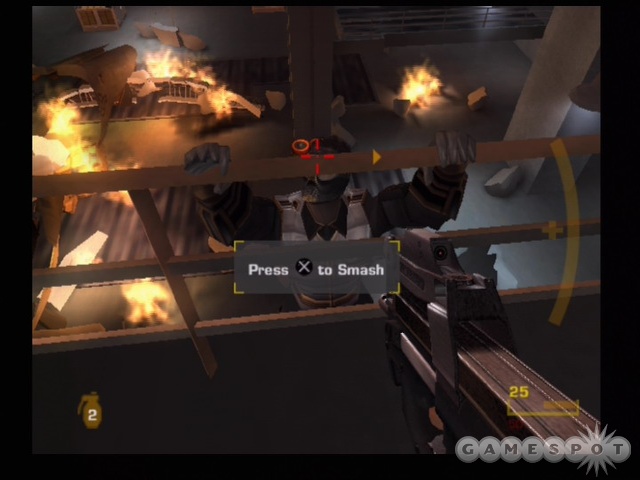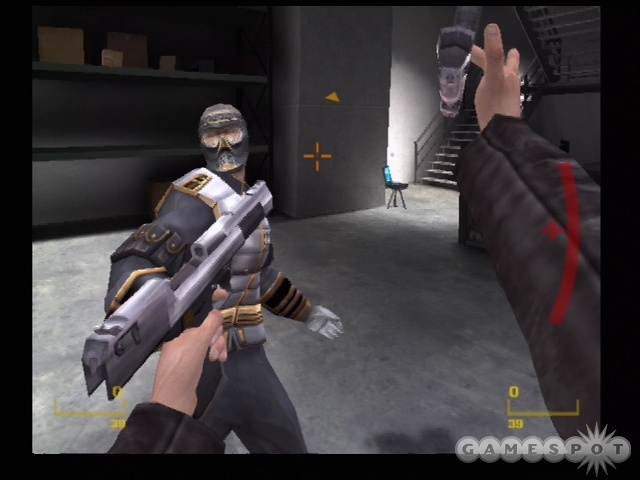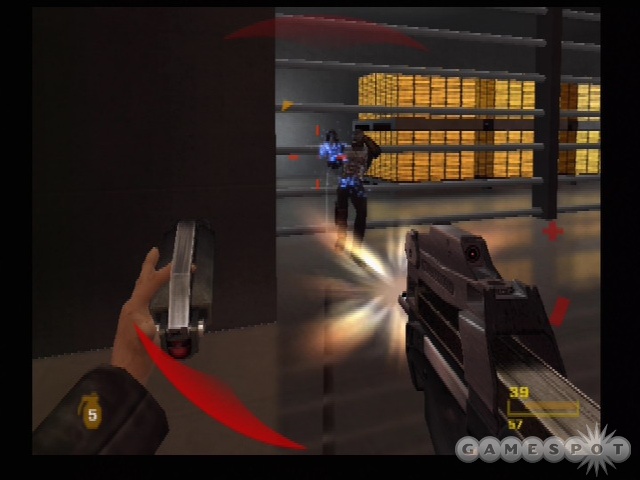With Pierce Brosnan vacating the role of James Bond, Electronic Arts has been put into an interesting situation. How do you make a James Bond game when there's no James Bond? Well, a hero is only as good as his opposition is bad, so there's certainly room to tell a story from the other side of the tracks. That's what EA has done with GoldenEye: Rogue Agent, but an uninteresting story and lackluster gameplay, both online and off, leaves this latest adventure feeling rather flat.

GoldenEye: Rogue Agent bears a similar name to Rare's Nintendo 64 first-person shooter, GoldenEye 007, which was a first-person shooter take on the Bond movie, GoldenEye. GoldenEye 007 is remembered as a classic, as one of the best early games for the platform. Yet this new game has absolutely nothing to do with that game, apart from belonging to the same genre, and it only has passing references to the film (namely the inclusion of the character Xenia Onatopp). By resurrecting the name, but not referencing much of the GoldenEye material, the whole game feels like a cheap attempt to cash in on the nostalgic feelings that many have for the Nintendo 64 hit. It's perhaps the most "evil" thing about GoldenEye: Rogue Agent.
GoldenEye's single-player campaign spans across eight missions, putting you in the role of a former secret agent that has been booted out of her Majesty's secret service for being too ruthless for the job. This sends you into the waiting arms of Auric Goldfinger, who takes you in and fixes an eye injury you received while fighting Dr. No by giving you--wait for it--a golden eye! The story then pits Goldfinger against Dr. No. However, the cutscenes that feed you plot points don't really keep you in the loop very well, and the menagerie of returning Bond villains make the whole "what if?" scenario feel like second-rate fan fiction.
Your eye implant has some helpful powers that become available as you progress through the campaign, and this is GoldenEye's only gameplay feature that makes it conceptually different from other recent shooters. You start out with the ability to see through walls, and then you quickly get the abilities to hack machines (specifically, to hit switches or to prevent guns from firing) from a distance, create a shield that blocks all damage, and unleash a telekinetic attack against enemies. All of these draw from an eye energy counter, which slowly rebuilds after use. The bullet shield is really the only truly useful tool in the set, though, as it always comes in handy. The X-ray vision and hacking are effective in a few specific spots, and the toss attack takes way too much energy to be useful in a crowd.
Playing as a bad guy is meant to be the main focus of GoldenEye's gameplay, but the extent of your evil deeds is pretty much limited to grabbing stunned guards, using them as human shields, and then tossing those same enemies into other guards. The storyline has you performing some objectives that aren't really something a good guy would be doing, but the fact that the game pretty much plays out as Goldfinger versus Dr. No in a "who is the evilest of them all" competition keeps the game from feeling any different than your average Bond game. If the developers truly wanted you to be evil, you'd be kicking puppies and taking actual hostages, not merely defending yourself from other evildoers.

GoldenEye plays sort of like a low-rent version of Halo 2, and like that game, it contains both dual-wielding and a health meter that recharges to 100 percent if you stay out of the line of fire for a few seconds. Given the game's abundance of cover and the artificial intelligence's lack of drive when it comes to flushing you out, the meter recharge makes the game a simple matter of having enough patience to pop out, shoot a few guys in the face, then duck behind cover again to let your health and shield recharge. Enemies will slowly close in over time, but this just opens them up to a head shot, which is an instant kill when you do it right, and doing it right is awfully easy, especially on the standard enemies.
The game's levels are poorly paced. Eight levels might not seem like a high number, but most of them are long to the point of being tedious. The rooftops of Hong Kong seem to go on forever. Escaping the underwater facility, known as the Octopus, also takes a lot longer than it should. Part of this is because the game's environments are pretty bland, but most of the blame falls squarely on the lack of variety. You'll only encounter a few different types of foes, and almost all of the game's enemies are just soldiers wearing varying degrees of body armor. You'll occasionally bump into a bad guy that actually has a name that appears when you target him. While this would have been a cool way to give the enemies personality or to include some tougher foes, these commanders just have shields that make them take more shots before keeling over. Better AI would have made the game's combat much more interesting. At least there's a pretty good variety of weapons to work with.
Rogue Agent's weapon list is filled with most of the usual suspects, but there are some unique tools here, as well. You start out with a pistol that never runs out of ammo, as well as a few hand grenades, but you'll also run into submachine guns, assault rifles, one-handed shotguns, a rocket launcher, a sniper rifle, and more powerful pistols. On the more fantastical side, you'll occasionally come across pistols that fire explosive shots (that you can trigger yourself from a safe distance), a tranquilizer gun that slows down enemy movement, and a little something that will just evaporate your opponents. You'll even encounter a railgun that can fire through walls, which, when combined with your ability to see through walls, essentially becomes the X-ray gun from Rare's other N64 first-person shooter, Perfect Dark.

To prevent you from getting lost or, really, from ever having to think about what you're doing, the game gives you an onscreen arrow that points you in the right direction. This works pretty well, though the level design is straightforward enough that you'll never really wonder where to go next, as there's only one way to go.
To add to the game's 10- to 15-hour single-player campaign, GoldenEye: Rogue Agent also has a multiplayer mode. On all three consoles, you can play split-screen with up to four players. This works in a pinch, but pales in comparison to the eight-player multiplayer available online on the Xbox and PS2. However, the game's multiplayer mode pales in comparison to that of many other online first-person shooters. You're given a lot of standard options and modes that can be played free-for-all or with a team, but the core action isn't exciting enough to make any of these modes very interesting. The game moves at a fairly sluggish pace, and aside from the occasional tactical significance of your eye powers, it feels very plain. Additionally, you need to play through the single player to unlock many of the game's maps, which might be frustrating if you're not interested in trudging through the campaign.
Graphically, GoldenEye: Rogue Agent looks OK. The character models look fine and animate well. Some of the death animations are a little too drawn out, and get a little repetitive over time. The environments are of a decent size, and while there are some varied locations over the course of the entire game, for the most part you'll see a lot of the same terrain again and again within one mission. The game appears on all three consoles, and it looks roughly the same across all three. As usual, the Xbox version of the game looks better than the others, and it also has the side benefit of controlling a bit tighter than the other two versions, but not so much that you'd notice unless you were specifically looking for a difference.

On the sound side of things, GoldenEye does well, but doesn't stand out. The game's music is appropriately Bond-like, though none of it is especially noteworthy or prominently featured. The weapon sound effects are varied. Some of them are appropriately loud and boomy, but others, such as the P-90-like submachine gun, don't sound like much at all. GoldenEye's enemy speech is probably the most impressive part of its sound. The enemies' shouts are pretty specific to your current situation, so they'll shout things like "he's over by the hologram" at just the right time. They'll also shout out things about your current armaments, like "he's got a sniper rifle" or "he's using a shield!" This gets a little silly, though, when they start to shout "dual weapons" when you're holding two guns.
Perhaps the worst part about GoldenEye is the fact that EA had successfully transitioned the Bond series out of the first-person shooter genre not even a year ago with the release of Everything or Nothing, which was a great action adventure game. Now, the company is right back to making substandard shooters with the Bond license, and this one even takes the name of the game that made Bond and first-person shooting such a great mix back in the day and drags it through the mud. Don't be fooled: This isn't the GoldenEye you remember playing on the Nintendo 64. Rogue Agent is competent at best, but mostly it's a subpar first-person shooter that fails to stand out in any way.